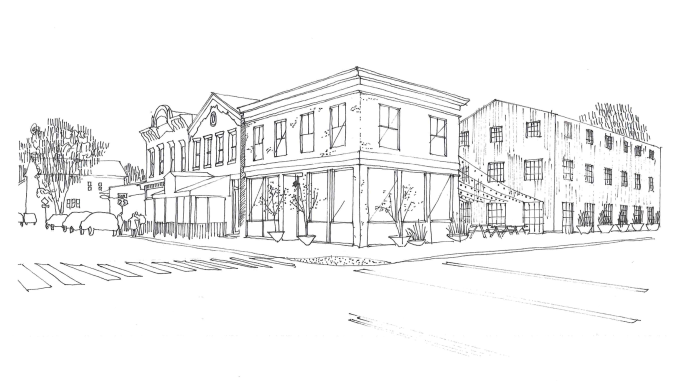
Representatives for a proposed 22-room hotel in the heart of Greenport accused the village Planning Board of being “adversarial” at an Oct. 27 meeting.
“Without overstating, it seems like some of the responses that we’ve had were adversarial. We come here to work through a process with you. We want to be open, transparent. We want to resolve any issues that you bring up. But we need reasonable and open minds. And I’ve asked you to keep your minds open as you review all of the information that we’ve submitted,” said attorney David Gilmartin Jr., who was speaking on behalf the applicant.
Hotelier Erik Warner presented plans to convert the former Sweet Indulgences on Main Street, which closed last year after nearly 30 years in business, to the Planning Board in April. The project, dubbed Greenport Inn, involves building two structures on the Retail Commercial-zoned 0.19-acre parcel at 200 Main St..
At the Oct. 27 pre-submission conference, a continuation of meetings from April and May, Mr. Gilmartin said the front building would be used as a reception area with an office and guest rooms would be in the rear building. Original application materials indicate the existing one-story building would be demolished to make way for a three-story hotel.
The Planning Board has “identified issues that need to be looked at and reviewed” concerning traffic, density, parking, safety and operations before the site plan process can continue, Mr. Gilmartin said. An engineering consultant later presented a parking and traffic study to the Planning Board on behalf of the applicant.
“Our parking study, when you have a chance to look at it … is objective and it is exhaustive. It [was conducted] July 8 and 9, this was a Friday and Saturday, from 10 in the morning until 10 at night,” he said to the Planning Board. “We received in response to that, some information from your consultants, it involved a 2018 Google Earth map questioning the results of what was an objective study of the parking, they said there was something wrong with the outcome of our, again, objective study.
“I will say to you that I would ask you to disregard that part of the response,” he continued. “And I would say to you that that’s a fair comment, if we were to present a 2018 Google Earth, a snapshot in time, we’d be laughed out of this room … What we provided is legitimate, objective evidence.
“Again, we have the Sound View, which has extra parking, and we can park at the high school as another option,” he said. Employees, he added, would park off site and be transported to the inn. All deliveries would occur at off-peak times to avoid interfering with hotel operations.
An outdoor courtyard would be limited to hotel guests, who would access the area with a key. The courtyard would be open for use between 8 a.m. and 9 p.m. with no loudspeakers, and would be secured by staff, cameras and a gate.
“I think if you review the code, that this is one of the less intensive uses. For many years, this village may have been lucky that Sweet Indulgences wasn’t a destination, but something of a place that people went to as they walked by, except for maybe Valentine’s Day, people would go there. So consider the other uses, because one of those uses is coming to the site. And I’d submit to you that this is one of the less intensive uses as part of your code,” Mr. Gilmartin said.
An engineering consultant for the applicant described the project as a “low-amenity hotel” with no restaurants or bars. Five parking spaces would be provided on site and the applicant is seeking to use payment in lieu for the other 20 required stalls. There would also be two stalls for guests to load and unload.
The consultant noted, in a description of a traffic and parking analysis, that his firm does not believe the project would risk public or pedestrian safety and that “there’s enough space within a reasonable walking distance of the proposed project to accommodate the parking demand.”
An architect for the project said “a more traditional building” will face the road, “to continue the context of Main Street” with a “more industrial look to kind of appeal to the working harbor, which is to the east.” The hotel has been intentionally designed with small rooms to motivate people to spend time in the business district, he noted.
“Zoning-wise, we are asking for a relaxation of parking, which is not unusual in a village. And our other zoning request is for the third story,” he said.
Application documents submitted in May indicate the objective of the project is to “operate as a quiet inn tucked into the heart of the village.”
“There will be very few employees as the inn will be operated using the latest technology to communicate with guests as well as allow said guests to check in to and out of their rooms, provide driving directions, general communications, etc.,” the application continues. “Employee responsibilities will be limited to one front desk supervisor team member and, depending on occupancy levels, up to two housekeepers.”
Mr. Warner told a reporter nothing has changed from the original application.
“We have submitted a traffic/parking study and supplement that demonstrates that our proposed project will not negatively impact the village and is in fact less impactful than a retail use,” he said.The Planning Board approved a motion to continue the pre-submission conference on Monday, Nov. 28.

